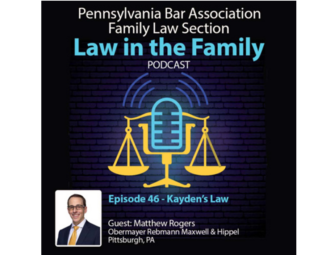The Legal Intelligencer: Notice in PFA Indirect Criminal Contempt Case Examined by Pa. Supreme Court
In an article published in The Legal Intelligencer on February 6, 2023, partner and co-chair of the family law group, Michael Bertin, discusses protection from abuse orders. In the article, titled “Notice in PFA Indirect Criminal Contempt Case Examined by Pa. Supreme Court,” Michael analyzed the recent case of Commonwealth of Pennsylvania v. Stevenson, __ A.3d __, No. 21 WAP 2021 (Pa. April 12, 2022), which addressed the issue of notice in a protection from abuse indirect criminal contempt case.
Protection from abuse matters begin as civil cases. However, if the protection from abuse order is violated, the commonwealth may institute a criminal proceeding for indirect criminal contempt. If the commonwealth is successful, and the defendant is convicted, the defendant will suffer a criminal sentence, which may include probation or incarceration for up to six months.
In the Stevenson case, Ashley Yates filed an ex parte PFA petition and obtained a temporary PFA order against the appellant, Victor Stevenson. According to the opinion, Stevenson was served with the temporary PFA on the date that it was entered and was advised that a final PFA hearing was scheduled. However, Stevenson failed to appear at the hearing and a final order was entered. Included in the PFA order was a direction that Stevenson was evicted and excluded from Yates’ home. According to the opinion, Danielle Sutton (Yates’ cousin) was alerted at 3:30 a.m. on a night that she was spending at Yates’ home that someone was in the basement of the home. When she went to the basement, she discovered Stevenson. She informed Stevenson “you can’t be here.”
Thereafter, Yates filed a complaint and Stevenson was charged with indirect criminal contempt for violating the final PFA order. A bench trial was held, and the trial court found Stevenson guilty of indirect criminal contempt and sentenced him to six months of probation. Stevenson filed a timely notice of appeal. Thereafter, the Pennsylvania Superior Court affirmed the trial court’s decision and the Pennsylvania Supreme Court accepted Stevenson’s petition for allowance of appeal.
This case is important for the family law practitioner as PFA cases begin as family law cases. It is clear from the Supreme Court’s ruling that notice of a PFA order can be made in a broad manner. Therefore, defendants in PFA cases must be extra careful not to violate such orders even if the defendant has not received the order in hand or has been informed of such an order by a police officer or a person appointed by the court, as failure to serve shall not stay the effect of a valid order and the defendant with knowledge of the order can be convicted of indirect criminal contempt due to a violation of such an order.
Read the full article here.




